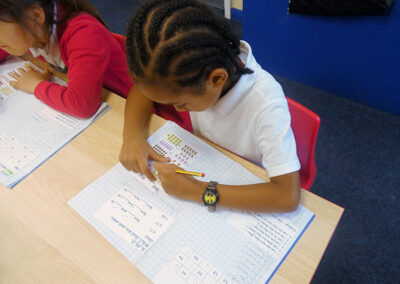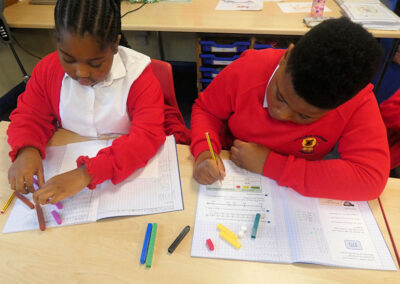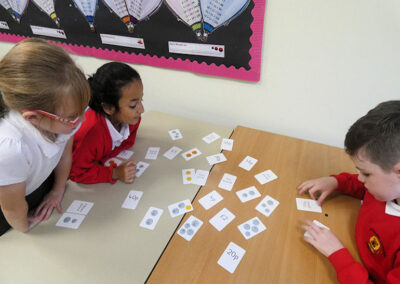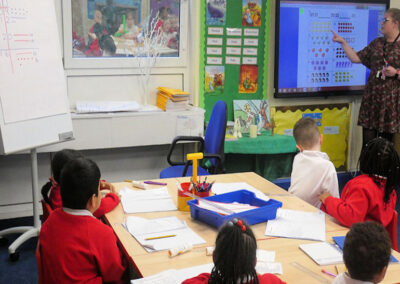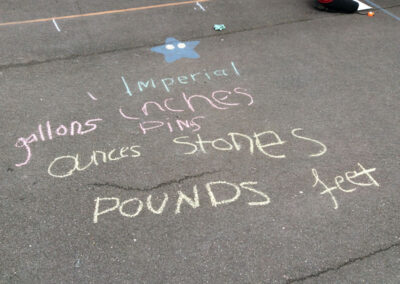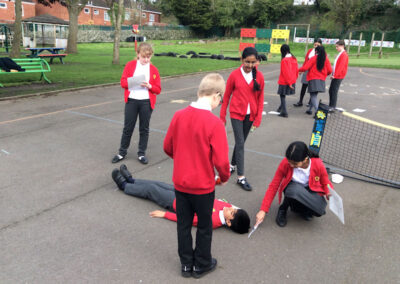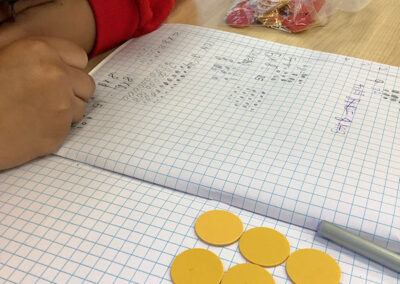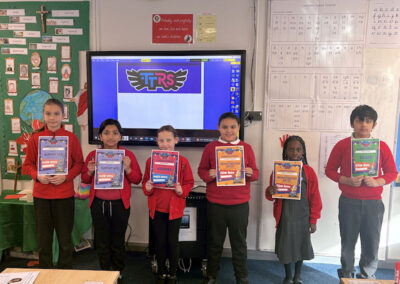Mathematics
Subject Intent
What is our intent for all children to achieve in this subject?
Number and arithmetic are at the heart of our maths curriculum here at St. Mark’s. We aim for all our children to become familiar with number in a variety of forms from an early age in order to develop confidence and understanding.
Through maths games, activities and ‘playing with number’ our children enjoy the subject and learn key facts, which helps them in many other aspects of the subject. We intend to make lessons varied, practical, engaging and enjoyable, catering for different learning styles and giving children the opportunity to succeed and be challenged at the appropriate level.
By making real-life links, children see the value and importance of maths as well as having opportunities to solve problems and try different methods, which aids understanding of the reasoning behind each concept. Through our curriculum, our children develop the required knowledge and skills to become confident and determined mathematicians who enjoy the subject and are ready to move onto the challenges of the subject at secondary school.
Curriculum Documents
- SEND provision and Adaptation in Mathematics
- Year 1 Maths Overviews – Autumn | Spring | Summer
- Year 2 Maths Overviews – Autumn | Spring | Summer
- Year 3 Maths Overviews – Autumn | Spring | Summer
- Year 4 Maths Overviews – Autumn | Spring | Summer
- Year 5 Maths Overviews – Autumn | Spring | Summer
- Year 6 Maths Overviews – Autumn | Spring | Summer
Also see our Calculations Policy on our Policies and Documents page.
What our Children Say…
“I like doing Fluent in Five lessons. I can see that I am getting better at answering the questions, in a quicker time. This will help with my SATs.” – Year 6 pupil
“I enjoy using the equipment in maths lessons. It helps me with my learning.” – Year 3 pupil
“I like the times tables challenges and maths games. They are fun and make us get quicker.” – Year 4 pupil
“Maths is my favourite subject. We get to use lots of equipment and sometimes go outside for our learning.” – Year 2 pupil
“I am getting better at Maths, because I can use the equipment. Sometimes, I don’t need the equipment because there are picture that can help me too.” – Year 5 pupil
What Maths looks like in action at St. Mark’s…
Maths is taught daily in each class across the school. Throughout the week, children have opportunities to develop their fluency, reasoning and problem-solving skills within the subject. In Keys Stage 1, in addition to their daily maths lessons, one lesson each week is dedicated purely to arithmetic. Alongside this they have daily lessons where they explore number, as these areas are key to developing a good understanding of mathematics.
In Key Stage 2, in addition to their daily maths lessons, the children have one lesson a week dedicated to developing their reasoning skill and daily fluency practise to embed taught strategies.
This helps children increase their competence, confidence and enjoyment of maths. Each class utilises a range of resources and equipment daily in order to cater for and engage all learners. Where possible, real-life links are made and opportunities are given within the lesson to challenge children further to extend their knowledge of the topic.
Early Years
It is vital that children are exposed to mathematics every day in the early years setting and we place a big emphasis on ‘playing with number’ here at St Mark’s. Children have opportunities to count and experiment with objects in order to build an understanding of numbers to 10 and the relationships between them. They are challenged to spot connections between numbers, to ask questions and to solve simple number problems.
In addition, we look for and explore mathematics in the world around us. For example, finding shapes and comparing distances using mathematical language. By the end of the early years, key mathematical language is embedded and we try to ensure children enjoy the subject due to the range of positive and exciting experiences they’ve had.
Importance of Number and Place Value
Knowledge and confidence with number is the key to almost all aspects of mathematics, so it is crucial for all children to develop a deep understanding of numbers and the relationships between them from an early age.
Children also need secure knowledge of the value of numbers and the individual digits within them. This enables children to solve problems confidently and effectively, developing the ability to apply all four mathematical operations – addition, subtraction, multiplication and division. Therefore, there is a large emphasis each year in all classes on number and place value. These are the first topics in the autumn term and are re-visited regularly as required.
We try to make these areas exciting and engaging for all children to ensure children enjoy their learning. Interventions in each class target children who need a little more support in securing their knowledge of key number facts. There is also weekly maths homework which revises learning.
Fluency, Reasoning and Problem Solving
These are the three main aspects of mathematics from the National Curriculum. To begin with, children must become fluent in each area, understanding concepts and being able to answer related questions which gradually increase in difficulty. Once this is embedded, the next step is to apply reasoning – explain logic, identify errors or find relationships using evidence as proof. This serves to deepen understanding. Finally, children move onto problem solving. This includes breaking tasks down and applying their knowledge in order to find solutions to more sophisticated challenges.
Each topic area taught at St Mark’s provides children with opportunities to develop their knowledge and understanding in all three areas. Once children are fluent, they are challenged in different ways to deepen their understanding and ensure they can apply what they’ve learnt to different situations. At each stage, learning is made practical and exciting with lots of resources used. We also make links to real life mathematics, so that children can see the relevance and feel like they are making valid contributions to solve real problems.


